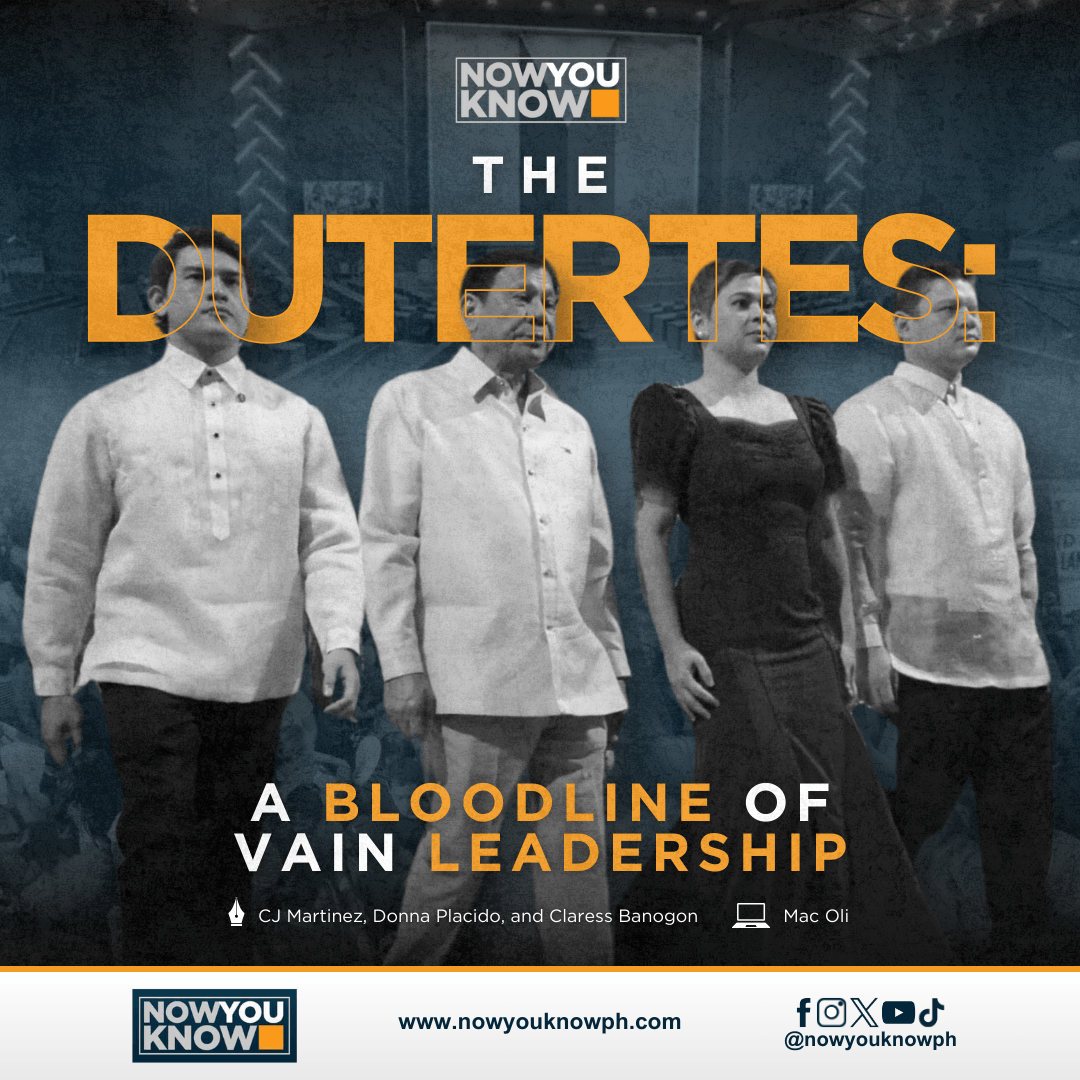The Dutertes: A bloodline of vain leadership
In the context of the Philippines’ political milieu, the name Duterte has been significant and controversial. From Rodrigo Duterte’s contentious tenure as President to his children’s climb to political power, the Duterte family’s prominence has become a flashpoint, sparking conversations on political dynasties in Philippine politics.
Just when you thought Sara was the end of the political bloodline, the Vice President had recently announced that three Dutertes would vie for a senatorial seat in the 2025 midterm elections.
Rodrigo’s return and Paolo and Sebastian’s climb to the political ladder signify the looming impact of the Duterte family on the country’s political scene. Simultaneously, they paint a tainted truth about the country’s political culture: that political diversity and power are obscured by the dominance of the culture of dynasty.
Expansion of influence
The Duterte family’s rise to power in the Philippines shows how local leaders can become big national leaders. Beginning with Vicente Duterte, a governor of Davao, the family’s political legacy was firmly established and later expanded by his son, Rodrigo Duterte.
He started his political career in Davao City as the prosecutor before becoming a Vice Mayor and, later, Mayor. Known for his strict policies and tough talk, he served as mayor for over 22 years across several non-consecutive terms.
While his leadership approach, which involved a lot of populist policies and authoritarian methods, was both lauded and feared, Rodrigo’s experiences in local politics laid the groundwork for his presidency in 2016. This paved the way for his children to gradually enter the political sphere, from local to national level.
Additionally, the war on drugs campaign was Rodrigo’s most controversial legacy as the president of the Philippines. This campaign led to the death of over 12,000 Filipinos who were allegedly connected to drugs and crime. His administration’s heinous and massive killings sparked an ongoing case with the International Criminal Court (ICC) that has not been settled until today.
Sara Duterte, former Davao City mayor, is currently the Vice President of the Philippines. Her leadership, however, drew strong flak when lawmakers criticized the Office of the Vice President’s 2022 confidential fund expenditure amounting to over P125 million.
Sara also took on the Secretary of the Department of Education (DepEd) but resigned on June 19, 2024. Her rise to national politics was a milestone for the Duterte dynasty as it marked the continuation of their family’s influence on national politics.
Moreover, Paolo Duterte’s presence in the House of Representatives further extends the family’s reach and political clout. Issues and anomalies regarding funds and public money marked his standing in the House of Representatives.
According to the House Committee on Appropriations, he was allocated a total of P51 billion for Davao City’s first district infrastructure development, the highest budget by any legislative district in history ever acquired. However, a detailed receipt for the distribution of this amount has not been revealed yet.
Meanwhile, maintaining their legacy in Davao City is Sebastian Duterte as mayor, whose governance is closely similar to that of his father. He asserted his power and dominance by presenting a tough image.
Just like Rodrigo, he also ordered a “drug war” in the city of Davao, which killed seven drug suspects in just a week of implementation. This behavior underscores a tendency towards authoritarianism and utilizing force to maintain control.
The Dutertes remain popular despite controversies because some Filipinos like their strong, decisive way of governing, which they believe is necessary to tackle the country’s ongoing problems. While the strongman approach offers short-term solutions to some issues, it risks long-term negative impacts on democratic governance and unprejudiced development in the country.
What’s at stake?
Sara’s confirmation of father Rodrigo and brothers Baste and Paolo’s plan to seek senatorial posts poses an immense threat to the democratic outcomes of the forthcoming 2025 midterm elections. With each electoral success, the Dutertes cement their legacy, potentially sidelining more diverse and representative voices in governance.
Stronger dynastic manifestations. The Dutertes’ decision to have multiple candidates for the Senate clearly indicates their intent to expand their political dynasty. Their success in securing seats would amplify their influence over legislative processes, enabling them to significantly shape the national agenda.
This move is about maintaining their political relevance and solidifying their control over key government institutions. It also means that their family’s presence could lead to more dynastic manifestations in Philippine politics, where family ties and political loyalty often impact election outcomes.
Shifts in policy direction and political authority. A stronger Duterte influence in the Senate could result in substantial shifts in policy direction. Rodrigo’s experience and political clout, combined with his children’s perspectives, could push the Senate for more strict law enforcement measures, which would somehow reflect the Duterte brand of governance.
Furthermore, such dominance could undermine democratic principles, as the balance of power may tilt heavily in favor of one political faction. This could decrease the effectiveness of opposition parties and diminish the Senate’s role as a check on executive power. Basically, how can you maintain a healthy political environment if political views are not represented and democratic processes are being ignored?
Balance of power and effects on future elections. If the Duterte family secures a spot in the Senate, it can shape the legislative landscape for years to come. Of course, Baste Duterte, being groomed as the presidential candidate for the 2028 elections, will benefit from the political groundwork laid by his family members.
Well, the midterm election outcome will have a really big impact on the political dynamics in the country. A strong performance by the Duterte candidates could signal a continued public endorsement of their government style and policies.
Conversely, if they face significant resistance or fail to have the desired seats, it could indicate a shift in public opinion and open opportunities for other political actors to gain traction.
Tainted political diversity
The truth is that power is hereditary in a dynasty. By patronizing such a culture, we limit the political arena only to those whose family names already have established capability to rule. Consequently, we neglect the right to political independence inherent to us, the Filipino masses.
A dynasty’s polarized promise of sustaining effective leadership through a bloodline of rulers is no different from the Dutertes’ objective to continue the legacy of their name. However, with political legacies as tainted as the Dutertes’, we risk a whole nation and a political system becoming further entrenched in the culture of a dynasty, thereby perpetuating the cycle of power concentration and potentially stifling true democratic progress.
As the three Dutertes continue to make their way to national politics, a single win adds to Sara’s vain victory as the country’s Vice President. The family’s expanding influence reveals a consolidation of power and a reinforcement of their dynastic hold over the political landscape.
This progression raises questions about the future of democratic processes in the Philippines and whether political power will remain concentrated within a few elite families, fashioning policies and national direction in conformity with their interests.
The Duterte family, branded with populism and authoritarian tactics, continues to dominate, leaving an indelible mark on the country’s political and social fabric.




There are no comments yet. Add your comment to start the conversation.